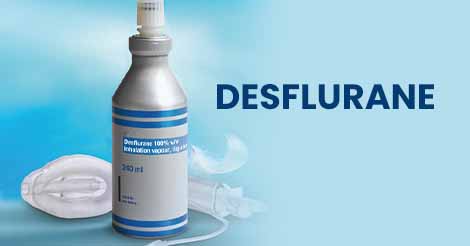Is Desflurane the Anaesthetic For You?
There are times in life when anaesthesia is necessary, a loss of sensation that is temporary. It is essential for some surgeries and medical procedures that cause severe pain and medical conditions. Anaesthetics are used during tests and surgical operations to reduce the body's sensation or to numb certain areas of the body. It helps prevent pain and discomfort during the wide range of medical procedures to be carried out. The term ‘Anaesthesia’ states “loss of sensation". The medicines which are used to induce anaesthesia are called anaesthetics. Anaesthetics block the signals that pass along your nerves to your brain. When the effect of the drug weakens, you start to feel the normal sensations again. People under anaesthetics will lose feelings of pain and other sensations.

There are two types of commonly used anaesthetics, one is local anaesthesia and second is general anaesthesia. Local anaesthetics are used to numb a small area of the body and the rest of the body remains fully conscious. This is often used during minor procedures or operations. General anaesthetics is where the patient is unconscious and unaware of the procedure. It is beneficial during complex and severe operations and surgeries. Anaesthetists (doctors who specialize in anaesthesia) are responsible for providing anaesthesia to patients for operations and procedures. Anaesthetics are given as an ointment (spray or drops), an injection into a vein, or as a gas, you breathe in. The exact mechanism is not known but, anaesthetics stop the nerves from passing signals to the brain. That means you do not feel anything. There are medicines used for the induction and maintenance of anaesthesia. Desflurane is one such medicine the doctor may use.
What is Desflurane?
Desflurane is beneficial to put a patient to sleep after surgery (induction) or to cause sleep during a surgery or procedure (maintenance), in adults. It is also used for the maintenance of anaesthesia in paediatric patients. Desflurane is a general anaesthetic. Inhalation of desflurane can cause general anaesthesia (loss of consciousness) too. It can be specially used for adults, before and during surgery. It has proven to be a good medicine as a maintenance anaesthesia for both children and adults. It can be used as a maintenance anaesthesia after using some other anaesthesia for the induction of sleep.
How is Desflurane available
You will find Desflurane is mostly used in the outpatient surgery unit. It is to be inhaled; it comes as a volatile liquid. Desflurane is sold under the brand name Suprane.
Precautions Before taking Desflurane
You must check with your doctor about the risks associated with any medicine before starting the therapy. Discuss the benefits and risks associated with Desflurane. Inform your doctor about all the medicines you take, including any herbal drugs and over-the-counter medicines. Desflurane may interact with other drugs you consume and so it is vital to keep your doctor informed about your daily intake of medicines.
What you need to inform your doctor before taking this medicine
• If you have an allergic condition
• About Pregnancy or breastfeeding.
• Any other medications
• If you have asthma or an airway infection.
• Heart or blood vessel disease
• Muscle weakness or related problems
• Liver Disease
Make sure the doctor knows your medical and family medical history. Follow all instructions of your doctor.
How to take Desflurane?
is to be given only by a trained doctor under supervision. The administration is different for each patient and can be individualized as per the response. It is highly fluorinated methyl ethyl, widely used in surgeries, for maintenance of general anaesthesia. Desflurane is to be inhaled as an anaesthetic. In adults, inhaled Desflurane causes a general loss of consciousness, before and during surgery. It is also used as maintenance anaesthesia in both children and adults before and during surgery. In adults, the minimum alveolar concentration (MAC), the concentration at which 50% of patients do not respond to surgical incision, ranges from 7.3% (25 yr. of age) to 6% (45 yr. of age). MAC is reduced (5.2%) at 70 years of age. For paediatric surgical levels of anaesthesia range from 5.2% to 10%. General anaesthetics may cause some people to feel tired, sleepy, or weak for a while after they have been given. Anaesthesia hampers the patient’s ability to think so, it is advised not to drive, use heavy machines, or do any activities which may prove to be dangerous for at least 24 hours after administration of Desflurane.
Side effects associated with Desflurane
All drugs cause some unwanted effects along with their main and intended effect. The unwanted effects are nothing but the associated side effects. Some people get mild side effects and some do not have any. There are a few who might react severely. It is best to know the side effects and be alert. If you find any side effect bothering you, consult and discuss it with your doctor. Common side effects are mild and tend to get better with time.
Common Desflurane side effects
• Mild Memory Problems or Confusion.
• Worsen Diabetes
• Upper Respiratory Tract Infection, Abdominal Pain
• Nausea/Vomiting
• Muscle Problems Like Muscle Pain/Tenderness/Weakness
• Signs of kidney and liver Problems
• Yellowing Eyes/Skin, Dark Urine, Stomach/Abdominal Pain.
The severe side effects of Desflurane are given below
• Blurred vision
• Chest pain or discomfort
• Dizziness, headache, light-headedness, nervousness
• Irregular heartbeats or fast pulse
• Tiredness and slow or irregular heartbeat
• Dark urine, difficulty with moving
• Reddening of the skin
• Joint pain, muscle pain, pain in the jaw, back, or neck.
Consult your doctor immediately, if you feel you are experiencing any severe effects or have any bothersome symptoms.
How to know if Desflurane is the correct drug for you:
The MEDNAWise pharmacogenetic test from Indus Health Plus is the sure way to know if Desflurane is the drug for you. Advances in science now have precision medicine that has personalized medicine for each individual. Each individual is different because of the genes. These genes are responsible for your body’s response to any drug or medicine you take. It is because of these genes that each person has a different response to the same drug. A MEDNAwise test is a diagnostic tool that studies these genes and the results tell you your body’s response to over 70 drugs across various medical specialties. It saves you money, time and all the severe adverse effects you may experience when a drug does not suit you. With the MEDNAwise test, the doctor can determine the correct medicine and dose for you, with the minimum side effects. It may sound complicated, but it is a simple and convenient test, that you can do yourself at home. Collect a saliva sample and send it for testing. Once the results are out the genetic counsellors help interpret the results and suggest future health plans. This a one-time test, the results can be reused anytime you need. The results are crucial for any medical emergency you may face in the future. The doctors would have information and would know the exact drugs and dosage to start the treatment for you. It is the best way to optimize treatment plans for better and quicker results. It is the best medical healthcare has to offer! Take the step towards good health and get the MEDNAwise pharmacogenetic testing done. Call Indus Health Plus today!
Get In Touch with Our Health Expert
Why Choose Indus Health Plus?


